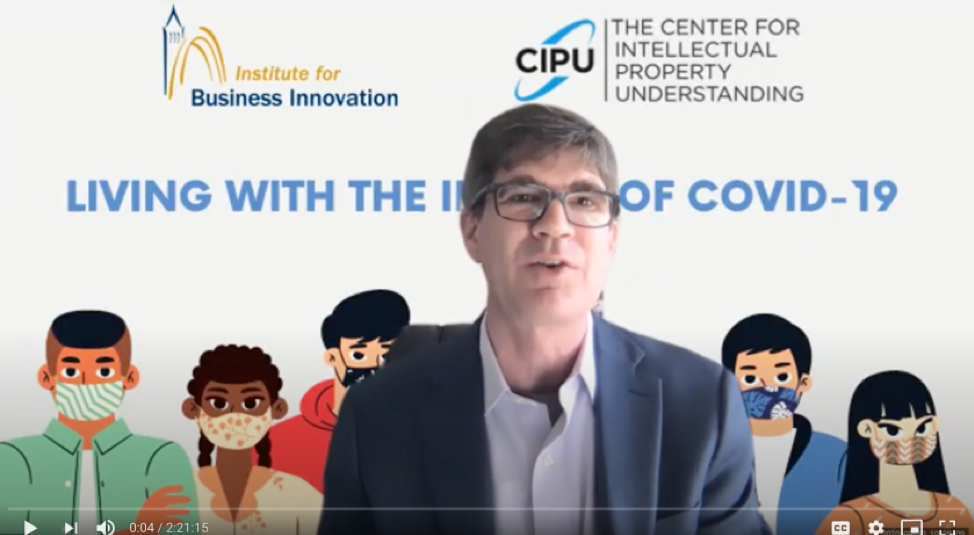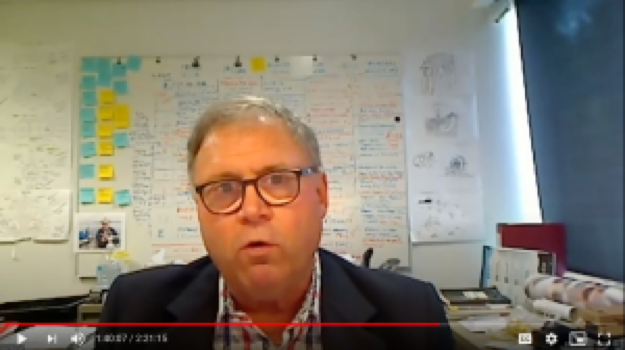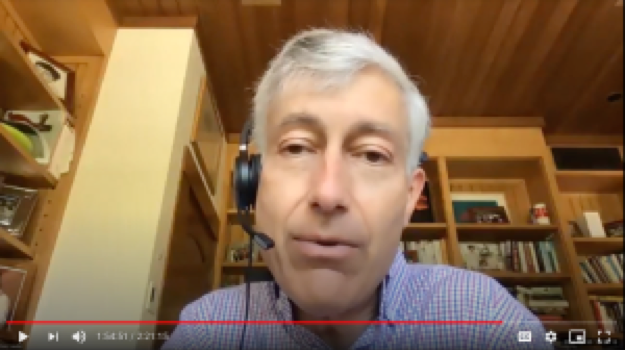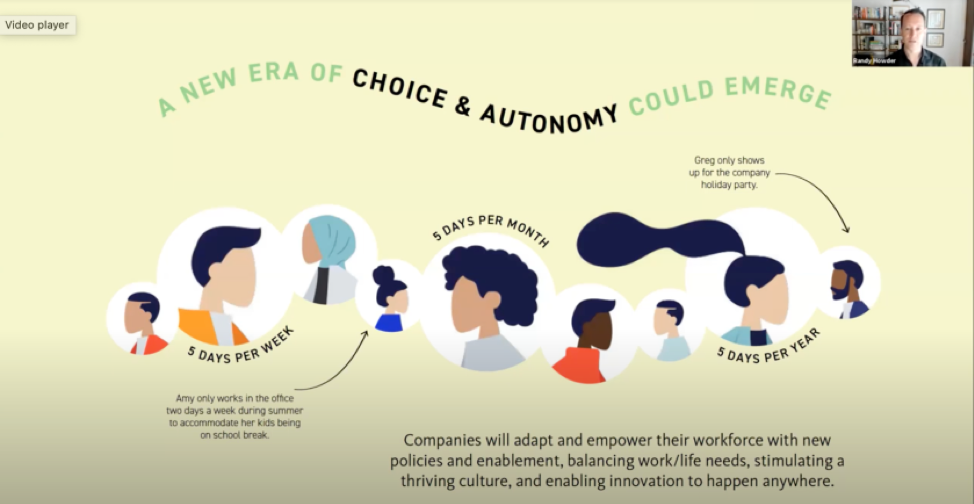“Businesses place expensive bets on the future, which is fraught with risk….. Rapid response requires confidence in an intellectual property system that works and policy that supports business.” – Danny Marti
 “The world is unaware of the cannibalistic nature of the current IP system and what it means for innovation and jobs,” Dan Brown, an award-winning inventor (40+ patents) and Professor of Design at Northwestern University, told a livestream presentation last week, titled ‘Living with the Impact of Covid-19.’
“The world is unaware of the cannibalistic nature of the current IP system and what it means for innovation and jobs,” Dan Brown, an award-winning inventor (40+ patents) and Professor of Design at Northwestern University, told a livestream presentation last week, titled ‘Living with the Impact of Covid-19.’
He added: “We have failed to support the rights of the inventor. Providers of look-alike products, both domestic and foreign, are engaged in theft but not held accountable. It is more efficient to infringe or steal someone’s work than to spend the time and money to develop it yourself. The chances of being caught and punished are much more unlikely today than a decade ago.”

Dan Brown
Dr. Brown’s ‘InstaShield,’ an easily produced, patent-protected plastic shield that attaches to a cap, was created in response to the pandemic and has already sold more than one million units. More than 250,000 units have been given to nonprofits and charities to distribute.
Adam Mossoff, a professor of law at George Mason University, Chairman of the IP Forum at the Hudson Institute and a CIPU board member, said that “better literacy about the economy reflects basics in science and technology, but it should also include an awareness of property rights like patents and trademarks and what they achieve.” When it comes to intellectual property rights, people either do not understand their function or are similarly misinformed.
‘The Best of the Worst’

Gary Lauder
Technology investor Gary Lauder of Lauder Partners, whose slide presentation was called “Making the Best of the Worst,” said that the United States has had the information [about dangerous viruses] “but not the trauma and scar tissue of Asian nations.” His firm has invested in several COVID-related businesses, including Currative, a company currently responsible for approximately 10% of the COVID-19 tests administered.
Dr. Brown and fellow panelist, Rhonda Shrader, Executive Director of Berkeley-Haas’ innovative Entrepreneurship Program, agreed that the ability to pivot and scale quickly is what inventors and creators of COVID management and other solutions need to achieve to beat competitors to the market. Speed is more essential than ever and rapid prototyping using 3-D printing modules is an excellent tool. “We are seeing that many effective and financially sound COVID management tools can be relatively low-tech,” Shrader said.
Gensler, the world’s largest architectural firm, was represented by Randy Howder, Managing Director of the firm’s San Francisco office. Howder’s provocative slide presentation was entitled “Blueprint for the Future of Work.” It illustrated how COVID-19 is a catalyst for ushering in a new era of choice and autonomy (see illustration below).

“Recognizing people as individuals with different needs that might change over time is part of a social as well as a pandemic response,” Howder explained. “Most workers will be engaged in a variation of five when it comes to being present in the office, depending on their needs: “[they could be going back to the office] five days a week, a month or a year.” Physical configurations will need to be flexible to accommodate a range of needs as conditions change. Some spaces and locations may need to be repurposed.
Policy: A ‘Silent Role’
“Innovation policy and IP policy play a silent role in supporting new ideas and investment,” noted Danny Marti, former White House Chief of IP Enforcement and vice chairman of the Global Innovation Policy Center. Marti is also Director of Policy for RELX, the largest scientific data and publishing company. He said:
Businesses place expensive bets on the future, which is fraught with risk. The pandemic has increased risk. These businesses and those who provide them with capital need to know that they will receive a commensurate return if their judgment is right. More research and data are shared than people may be aware of. Successful drugs, for example, are often licensed and provided to nonprofits or at a low cost. Rapid response requires confidence in an IP system that works and policy that supports business.
“Because of increased and uncertain risks, incentives may be required to return to the workspace. These are new areas of cost and liability which we are just beginning to understand,” Charles Cicchotti a Managing Director at Berkeley Research Group told the livestream. “They will be with us for the foreseeable future.”
Dr. Cicchetti is an economist and former Chair of the Wisconsin Public Service Commission (PSCW). He was Deputy Director of the Energy and Environmental Policy Center at the John F. Kennedy School at Harvard University.
Dangerous Disconnect

Daniel Gerstein
“The disconnect between Wall Street and Main Street is greater than ever,” said Dr. Daniel Gerstein, a former Deputy Director of Science and Technology, United State Homeland Security and a RAND Corporation Senior Consultant. “The economy lacks resilience because we have chosen efficiency over preparedness. The novel coronavirus is not a ‘black swan’ event as some believe. Animals have been infecting humans with viruses and other diseases for some time. The best way to deal with a crisis is before it occurs.”
For the “Living with Covid-19” website, go here. A recording of the livestream can be found at this link. The two-panel Zoom event was held by the Center for Intellectual Property Understanding (CIPU) in conjunction with the Institute for Business Innovation, a part of UC Berkeley’s Haas School of Business.
Image source: Center for IP Understanding

![[IPWatchdog Logo]](https://ipwatchdog.com/wp-content/themes/IPWatchdog%20-%202023/assets/images/temp/logo-small@2x.png)

![[Advertisement]](https://ipwatchdog.com/wp-content/uploads/2024/04/Patent-Litigation-Masters-2024-sidebar-early-bird-ends-Apr-21-last-chance-700x500-1.jpg)

![[Advertisement]](https://ipwatchdog.com/wp-content/uploads/2021/12/WEBINAR-336-x-280-px.png)
![[Advertisement]](https://ipwatchdog.com/wp-content/uploads/2021/12/2021-Patent-Practice-on-Demand-recorded-Feb-2021-336-x-280.jpg)
![[Advertisement]](https://ipwatchdog.com/wp-content/uploads/2021/12/Ad-4-The-Invent-Patent-System™.png)







Join the Discussion
10 comments so far.
Paul F Morgan
October 8, 2020 09:42 amMax, we were not talking about someone spaced apart more than 10-15 feet outdoors.
Also, if one is going to make historical patent enforceability comparisons like the authors here, one has to take into account that the current majority of patent suits are by PAEs, the majority are are not suits by companies or individuals that invented and/or used the patented invention [as used to be the case] with far more jury and judge appeal equities. Many more are now software related suits and suits on the same patent because different defendants must now be sued separately, etc.. Also, IPRs have significantly reduced suits in which defendants will pay relatively small settlement amounts just to avoid litigation costs even if the patent is invalid, so that case outcome comparisons should be made only of those patent suits that go through trial and appeal.
MaxDrei
October 8, 2020 04:49 amPaul, not talk to them, not even in the open fresh air? That’s an interesting observation on the extent of the division of society into two camps, us and them, those who wear always and those who wear never.
Here in Germany, mask-wearing has been more nuanced, up to now, because of an appreciation that indoors is different from outdoors. You know, a bit like (but of course not exactly the same as) exhalations of cigarette smoke.
Paul F Morgan
October 7, 2020 05:17 pmMax, I do not talk to, or even get near to, fools not wearing an actual mask these days.
MaxDrei
October 7, 2020 04:22 pmPaul, I agree there is a cloud, as when there is quiet conversation. But if you have to stand 3 to 5ft in front of somebody who laughs enthusiastically, coughs strongly, or shouts to make himself heard in a noisy environment, would you not feel happier if that person were wearing a shield in front of his face? After all, he would be generating 10 to 15 times as many droplets as a quiet talker.
Paul F Morgan
October 7, 2020 01:53 pmMax, the transmission is not primarily by “a droplet stream” but by a dispersing floating cloud of very fine droplets.
maxdrei
October 7, 2020 11:57 amPaul did anyone ever assert that a face shield would “stop” a droplet stream. Deflect yes. Stop no. Deflation is better than nothing though surely
Paul F Morgan
October 7, 2020 11:03 amSee the new $2 Billion judgement for the patent owners in Centripetal Networks, Inc. v. Cisco Systems, Inc. (E.D. Va. 2020).
Also see the recent research reports that plastic face shields do not stop Corona Virus air particles transmission.
Irving Rappaport
October 7, 2020 12:05 amIt was my honor to help Bruce Berman launch CIPU in 2016 to promote deeper and broader based understanding of Intellectual Property (IP), of critical importance to U.S. businesses. The U.S. must become much more aggressive in connecting the dots in the IP, and most importantly, the patent universe. Much more emphasis needs to be directed to integrating the various drivers of business, including IP acquisition, development, management, business formation and strategizing. Serious university-level educational programs that marry all the phases of innovation that lead to successful business endeavors are needed. Such programs engage students simultaneously in acquiring the disciplines, skills and expertise in the relevant fields in a unified educational endeavor. These include engineering; product management; law; business marketing, sales and aligning business and IP strategies; psychology; economics; and sociology, all necessary and integral components in successful businesses today. These skill sets must be launched from their silos into totally integrated and seamless programs. One such promising effort is the Center for Innovation, Inclusion, and Intellectual Property at University of California, Berkeley. Such efforts are needed to better compete in today’s global economy.
Patrick Kilbride
October 6, 2020 05:32 pmPatents for bio-pharmaceutical discoveries have meant a robust pipeline of vaccine and therapeutic candidates ready to be tested against COVID-19. Where are the fast, reliable diagnostic capabilities? The courts effectively denied the patentability of diagnostic tests, and in 2020 we have paid the price! Let’s not make the same mistake with regard to the PPE, telecommunications, scientific publishing, creative and educational content and other breakthrough solutions that we so desperately need right now.
Manny Schecter
October 6, 2020 04:40 pmIt is certainly true that we need to improve public understanding of intellectual property. Other countries, particularly China, are more advanced at promoting such understanding than the US. China promotes education about intellectual property much more pro-actively and systematically than does the US. IP disputes aside, the US could do more, much more, to promote IP education.